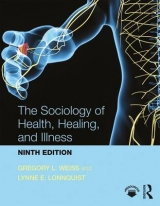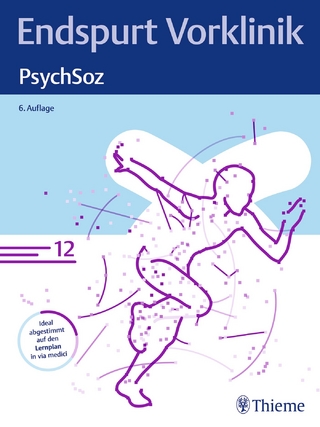
The Sociology of Health, Healing, and Illness
Routledge (Verlag)
978-0-13-380387-7 (ISBN)
- Titel erscheint in neuer Auflage
- Artikel merken
The Sociology of Health, Healing, and Illness, 8/e by Gregory L. Weiss and Lynne E. Lonnquist provides an in-depth overview of the field of medical sociology. The authors provide solid coverage of traditional topics while providing significant coverage of current issues related to health, healing, and illness. Readers will emerge with an understanding of the health care system in the United States as well as the changes that are taking place with the implementation of The Affordable Care Act.
Dr. Gregory L. Weiss is Professor of Sociology at Roanoke College where he teaches courses on medical sociology, ethics and medicine, Native Americans, and research methods. He has led student study tours to Great Britain, Luxembourg, Australia, and to the Navajo and Hopi reservations. Dr. Weiss is author or co-author of three books and more than three dozen journal articles. He works with a variety of local community organizations including a free health clinic and the SPCA. Dr. Weiss has received teaching awards from Roanoke College, the State Council of Higher Education in Virginia, the ASA Section on Teaching and Learning, and the Southern Sociological Society.
In this Section:
1. Brief Table of Contents
2. Full Table of Contents
1. Brief Table of Contents:
Part I: Perspectives on the Sociology of Health, Healing, and Illness
Chapter 1: A Brief Introduction to the Sociology of Health, Healing, and Illness
Chapter 2: The Development of Scientific Medicine
Part II: The Influence of the Social Environment on Health and Illness
Chapter 3: Social Epidemiology
Chapter 4: Society, Disease, and Illness
Chapter 5: Social Stress
Part III: Health and Illness Behavior
Chapter 6: Health Behavior
Chapter 7: Experiencing Illness and Disability
Part IV: Health Care Practitioners and Their Relationship with Patients
Chapter 8: Physicians and the Profession of Medicine
Chapter 9: Medical Education and the Socialization of Physicians
Chapter 10: Nurses, Mid-Level Health Care Practitioners, and Allied Health Workers
Chapter 11: Complementary and Alternative Medicine
Chapter 12: The Physician-Patient Relationship: Background and Models
Chapter 13: Professional and Ethical Obligations of Physicians in the Physician-Patient
Part V: The Health Care System
Chapter 14: The Health Care System of the United States
Chapter 15: Health Care Delivery
Chapter 16: The Social Implications of Advanced Health Care Technology
Chapter 17: Comparative Health Care Systems
2. Full Table of Contents
Part I: Perspectives on the Sociology of Health, Healing, and Illness
Chapter 1: A Brief Introduction to the Sociology of Health, Healing, and Illness
Definition of Medical Sociology
Historical Development of Medical Sociology
Sociology’s Contribution to Understanding Health, Healing, and Illness
The Role of the Medical Sociologist in the Twenty-First Century
Chapter 2: The Development of Scientific Medicine
A Brief History of Medicine
Early Humans
The Egyptian Civilization
Greek and Roman Societies
The Medieval Era
Medicine in the Renaissance
Medicine from 1600 to 1900
The Ascendancy of Medical Authority in America
Perspectives on the Ascendancy of Medical Authority
Part II: The Influence of the Social Environment on Health and Illness
Chapter 3: Social Epidemiology
The Work of the Epidemiologist
The Epidemiological Transition
Life Expectancy and Mortality
Infant Mortality
Maternal Mortality
Morbidity
Disability
Chapter 4: Society, Disease, and Illness
The Social Etiology of Disease
The Interrelationship of Proximate Risk Factors and Fundamental Causes: The Case of Develop-ing Countries
The Influence of Genetic Transmission on Disease and Illness
Cardiovascular Diseases
Cancer
HIV/AIDS
Alzheimer’s Disease
Mental Illness
Chapter 5: Social Stress
Definition of Stress
Historical Development of the Stress Concept
A Model of Social Stress
Stressors
Appraisal of Stressors
Mediators of Stress: Coping and Social Support
Stress Outcomes
The Role of Social Class, Race, Sexual Orientation, and Gender in Social Stress
Part III: Health and Illness Behavior
Chapter 6: Health Behavior
The Concept of Health
Health Behavior
Describing Individual Health Behaviors
Explaining Health Behavior
Chapter 7: Experiencing Illness and Disability
Stages of Illness Experience
Stage 1: Symptom Experience
Stage 2: Assumption of the Sick Role; Illness as Deviance
Stage 3: Medical Care Contact/Self-Care
Stage 4: Dependent-Patient Role
Stage 5: Recovery and Rehabilitation
Experiencing Chronic Illness, Impairment, and Disability
Part IV: Health Care Practitioners and Their Relationship with Patients
Chapter 8: Physicians and the Profession of Medicine
The Profession of Medicine
The Social Control of Medicine
The Number, Composition, and Distribution of Physicians in the United States
Female Physicians
Physician Satisfaction and Dissatisfaction
Physician Impairment: Stresses and Strains of the Physician Role
Chapter 9: Medical Education and the Socialization of Physicians
The History of Medical Education
Modern Medical Education
The Medical School Experience: Attitude and Value Acquisition
The Medical School Experience: Stress
The Medical School Experience: Career Choices
Future Directions in U.S. Medical Education
Chapter 10: Nurses, Mid-Level Health Care Practitioners, and Allied Health Workers
Evolution of Nonphysician Health Care Practitioners
Nurses and the Field of Nursing
Mid-Level Health Care Practitioners
Allied Health Workers
The Health Care Team
Relationships among Health Care Workers
The Changing Environment among Health Care Workers
Chapter 11: Complementary and Alternative Medicine
The Meaning of Complementary and Alternative Medicine (CAM)
Scientific Medicine and Alternative Healing
Complementary and Alternative Healers
Chiropractic
Acupuncture
Spiritual Healing and Christian Science
Ethnic Folk Healing
Chapter 12: The Physician-Patient Relationship: Background and Models
Models of the Physician—Patient Relationship
Key Dimensions of the Physician—Patient Relationship
The Current Move to Patient-Centered Care
The Influence of Social Class, Race, and Symptomology on the Physician—Patient Relationship
The Influence of Gender on the Physician—Patient Relationship
Patient Satisfaction with Physicians
Patient Compliance with Medical Regimens
Chapter 13: Professional and Ethical Obligations of Physicians in the Physician-Patient Relationship
Truth-telling as an Issue
Confidentiality as an Issue
Obligation to Treat Patients with Highly Contagious Diseases
Part V: The Health Care System
Chapter 14: The Health Care System of the United States
Rating the U. S. Health Care System
The U. S. Health Care System
The Financing of Health Care in the United States
Explanations for the High Cost of American Medicine
America’s Uninsured Population
Historical Efforts to Reform the Health Care System
Health Care Reform of 2010: The Patient Protection and Affordable Care Act
Chapter 15: Health Care Delivery
Hospitals
Freestanding Ambulatory and Surgical Sites
Nursing Homes
Hospices
Home Health Care
Chapter 16: The Social Implications of Advanced Health Care Technology
Societal Control of Technology
Health Care Technology
The Right to Refuse or Demand Advanced Health Care Technology
Organ Donation and Transplantation
Assisted Procreation
Chapter 17: Comparative Health Care Systems
Major Influences on Health Care Systems
Health Care Services in Developing Countries
Types of Health Care Systems
China
Canada
Great Britain
Russia
Common Challenges to Health Care Systems Around the World
| Erscheint lt. Verlag | 16.6.2014 |
|---|---|
| Verlagsort | New York |
| Sprache | englisch |
| Maße | 178 x 232 mm |
| Gewicht | 608 g |
| Themenwelt | Studium ► 1. Studienabschnitt (Vorklinik) ► Med. Psychologie / Soziologie |
| Sozialwissenschaften ► Soziologie | |
| ISBN-10 | 0-13-380387-2 / 0133803872 |
| ISBN-13 | 978-0-13-380387-7 / 9780133803877 |
| Zustand | Neuware |
| Informationen gemäß Produktsicherheitsverordnung (GPSR) | |
| Haben Sie eine Frage zum Produkt? |
aus dem Bereich



